从中式英语谈英汉语言对比
从语言学角度对比中英语言文化差异

从语言学角度对比中英语言文化差异语言是文化的一部分,不同的语言背后承载着不同的文化传统、价值观和习惯。
中英语言文化差异体现在词汇、语法、语音、修辞手段等方面。
下面就从语言学的角度对比中英语言文化差异进行探讨。
一、词汇1. 词汇量和构词法中文和英文在词汇量和构词法上存在较大差异。
中文是一个汉字文字,词汇量较大,而英语则是一个词汇量较小的语言。
中文的构词法主要通过字、词、词组的组合来表达意思,而英语则通过词根、前缀、后缀的变换来构词,例如happy(高兴的)→ unhappy(不高兴的)。
2. 文化价值的体现中英文词汇之间的差异体现了两种文化的不同价值观。
中文中的“家”和“爱”在词汇量和含义上都要比英文中的“family”和“love”更加丰富,反映了中文文化中对家庭和爱的重视。
二、语法1. 主谓宾的位置中英语语法结构有所区别。
中文是一种主谓宾的语言,句子的成分排列为主语+谓语+宾语,而英语是主谓宾的语言,句子的结构为主语+宾语+谓语。
“我爱你”在中文中的表达为“我(主语)爱(谓语)你(宾语)”,而在英文中的表达为“I(主语)love(谓语)you(宾语)”。
2. 时态和语态的表示方式中英语言在时态和语态的表示上也存在差异。
中文中时态的变化主要通过语序和词语的搭配来表示,而英文中时态的变化主要通过动词的变化和助动词的运用来表示。
语态方面,中文中的主动和被动的区分主要通过词语的表达来表示,而英文中主动和被动的区分则通过动词的形式来表示。
三、语音1. 声调的区别中文是一个声调语言,不同的声调可以改变一个词的意思。
而英语是一个非声调语言,重音的变化只会改变一个词的读音,而不会改变它的意思。
中文中的“ma”可以根据不同的声调分别表示“妈”、“麻”、“马”、“吗”等不同的意思,而英语中的“ma”只有一个读音,不会改变它的意思。
2. 元音和辅音的差异中英语言在元音和辅音上存在一定的差异。
中文的元音比较丰富,有多种单元音和复元音,而英文的元音比较简单,只有一些常见的单元音和复元音。
从语言学角度对比中英语言文化差异
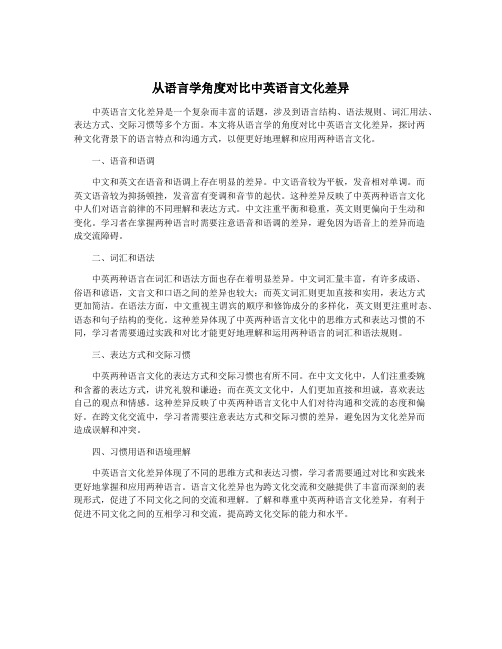
从语言学角度对比中英语言文化差异中英语言文化差异是一个复杂而丰富的话题,涉及到语言结构、语法规则、词汇用法、表达方式、交际习惯等多个方面。
本文将从语言学的角度对比中英语言文化差异,探讨两种文化背景下的语言特点和沟通方式,以便更好地理解和应用两种语言文化。
一、语音和语调中文和英文在语音和语调上存在明显的差异。
中文语音较为平板,发音相对单调。
而英文语音较为抑扬顿挫,发音富有变调和音节的起伏。
这种差异反映了中英两种语言文化中人们对语言韵律的不同理解和表达方式。
中文注重平衡和稳重,英文则更偏向于生动和变化。
学习者在掌握两种语言时需要注意语音和语调的差异,避免因为语音上的差异而造成交流障碍。
二、词汇和语法中英两种语言在词汇和语法方面也存在着明显差异。
中文词汇量丰富,有许多成语、俗语和谚语,文言文和口语之间的差异也较大;而英文词汇则更加直接和实用,表达方式更加简洁。
在语法方面,中文重视主谓宾的顺序和修饰成分的多样化,英文则更注重时态、语态和句子结构的变化。
这种差异体现了中英两种语言文化中的思维方式和表达习惯的不同,学习者需要通过实践和对比才能更好地理解和运用两种语言的词汇和语法规则。
三、表达方式和交际习惯中英两种语言文化的表达方式和交际习惯也有所不同。
在中文文化中,人们注重委婉和含蓄的表达方式,讲究礼貌和谦逊;而在英文文化中,人们更加直接和坦诚,喜欢表达自己的观点和情感。
这种差异反映了中英两种语言文化中人们对待沟通和交流的态度和偏好。
在跨文化交流中,学习者需要注意表达方式和交际习惯的差异,避免因为文化差异而造成误解和冲突。
四、习惯用语和语境理解中英语言文化差异体现了不同的思维方式和表达习惯,学习者需要通过对比和实践来更好地掌握和应用两种语言。
语言文化差异也为跨文化交流和交融提供了丰富而深刻的表现形式,促进了不同文化之间的交流和理解。
了解和尊重中英两种语言文化差异,有利于促进不同文化之间的互相学习和交流,提高跨文化交际的能力和水平。
从语言学角度对比中英语言文化差异
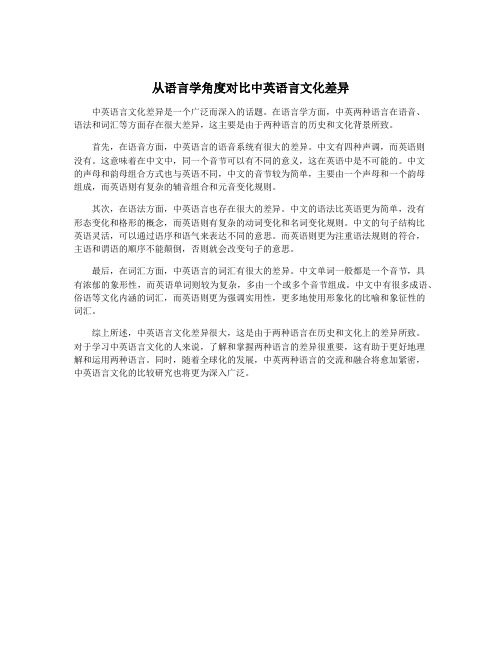
从语言学角度对比中英语言文化差异
中英语言文化差异是一个广泛而深入的话题。
在语言学方面,中英两种语言在语音、
语法和词汇等方面存在很大差异,这主要是由于两种语言的历史和文化背景所致。
首先,在语音方面,中英语言的语音系统有很大的差异。
中文有四种声调,而英语则
没有。
这意味着在中文中,同一个音节可以有不同的意义,这在英语中是不可能的。
中文
的声母和韵母组合方式也与英语不同,中文的音节较为简单,主要由一个声母和一个韵母
组成,而英语则有复杂的辅音组合和元音变化规则。
其次,在语法方面,中英语言也存在很大的差异。
中文的语法比英语更为简单,没有
形态变化和格形的概念,而英语则有复杂的动词变化和名词变化规则。
中文的句子结构比
英语灵活,可以通过语序和语气来表达不同的意思。
而英语则更为注重语法规则的符合,
主语和谓语的顺序不能颠倒,否则就会改变句子的意思。
最后,在词汇方面,中英语言的词汇有很大的差异。
中文单词一般都是一个音节,具
有浓郁的象形性,而英语单词则较为复杂,多由一个或多个音节组成。
中文中有很多成语、俗语等文化内涵的词汇,而英语则更为强调实用性,更多地使用形象化的比喻和象征性的
词汇。
综上所述,中英语言文化差异很大,这是由于两种语言在历史和文化上的差异所致。
对于学习中英语言文化的人来说,了解和掌握两种语言的差异很重要,这有助于更好地理
解和运用两种语言。
同时,随着全球化的发展,中英两种语言的交流和融合将愈加紧密,
中英语言文化的比较研究也将更为深入广泛。
中英文对比英语作文
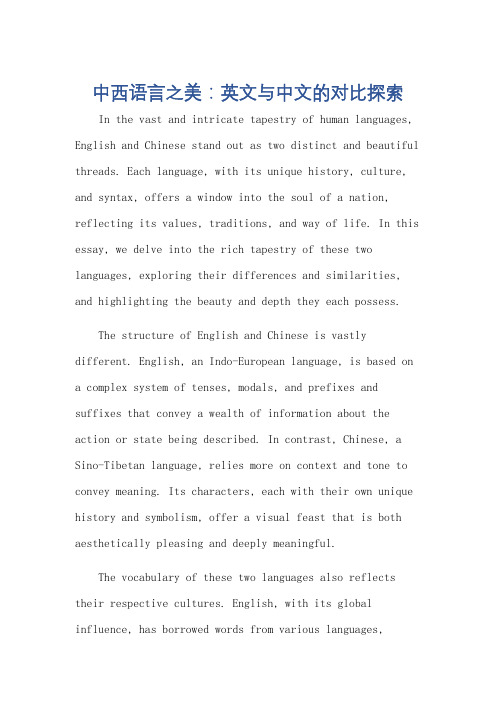
中西语言之美:英文与中文的对比探索In the vast and intricate tapestry of human languages, English and Chinese stand out as two distinct and beautiful threads. Each language, with its unique history, culture, and syntax, offers a window into the soul of a nation, reflecting its values, traditions, and way of life. In this essay, we delve into the rich tapestry of these two languages, exploring their differences and similarities, and highlighting the beauty and depth they each possess.The structure of English and Chinese is vastly different. English, an Indo-European language, is based on a complex system of tenses, modals, and prefixes and suffixes that convey a wealth of information about the action or state being described. In contrast, Chinese, a Sino-Tibetan language, relies more on context and tone to convey meaning. Its characters, each with their own unique history and symbolism, offer a visual feast that is both aesthetically pleasing and deeply meaningful.The vocabulary of these two languages also reflects their respective cultures. English, with its global influence, has borrowed words from various languages,giving it a rich and diverse vocabulary. Chinese, on the other hand, with its deep historical roots, has avocabulary that is deeply rooted in its culture and history. Its characters, often containing multiple meanings and associations, offer a deeper understanding of the Chinese way of thinking and values.Despite their differences, English and Chinese share a common goal: to communicate ideas and emotions effectively. Both languages have their own unique ways of achieving this goal. English, with its flexibility and adaptability, is able to convey complex ideas and abstract concepts with precision and clarity. Chinese, with its emphasis oncontext and tone, is able to convey a wealth of information and nuance with just a few words.In conclusion, English and Chinese, while vastlydifferent in structure and vocabulary, are both beautiful and unique languages that offer a window into the soul of their respective cultures. Each language has its own strengths and beauty, and it is through understanding and appreciating these differences that we can truly embracethe diversity and richness of human languages.**中英文之美:探寻英语与汉语的对比**在人类语言的丰富织锦中,英语和汉语作为两条独特而美丽的线条,显得格外引人注目。
英汉语言对比分析
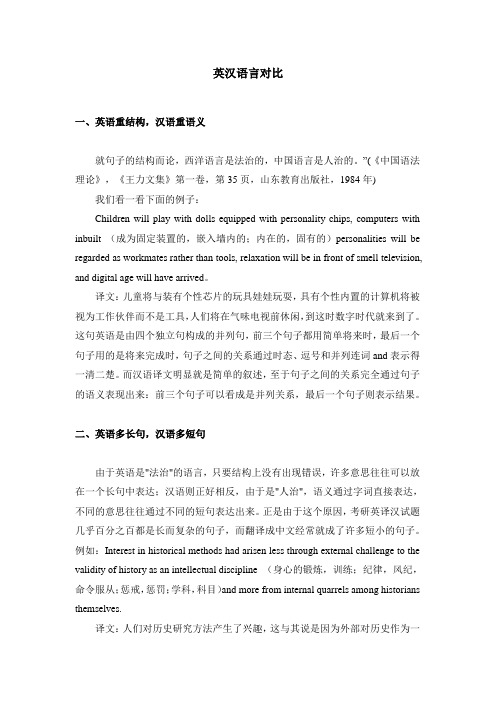
英汉语言对比一、英语重结构,汉语重语义就句子的结构而论,西洋语言是法治的,中国语言是人治的。
”(《中国语法理论》,《王力文集》第一卷,第35页,山东教育出版社,1984年) 我们看一看下面的例子:Children will play with dolls equipped with personality chips, computers with inbuilt (成为固定装置的,嵌入墙内的;内在的,固有的)personalities will be regarded as workmates rather than tools, relaxation will be in front of smell television, and digital age will have arrived。
译文:儿童将与装有个性芯片的玩具娃娃玩耍,具有个性内置的计算机将被视为工作伙伴而不是工具,人们将在气味电视前休闲,到这时数字时代就来到了。
这句英语是由四个独立句构成的并列句,前三个句子都用简单将来时,最后一个句子用的是将来完成时,句子之间的关系通过时态、逗号和并列连词and表示得一清二楚。
而汉语译文明显就是简单的叙述,至于句子之间的关系完全通过句子的语义表现出来:前三个句子可以看成是并列关系,最后一个句子则表示结果。
二、英语多长句,汉语多短句由于英语是"法治"的语言,只要结构上没有出现错误,许多意思往往可以放在一个长句中表达;汉语则正好相反,由于是"人治",语义通过字词直接表达,不同的意思往往通过不同的短句表达出来。
正是由于这个原因,考研英译汉试题几乎百分之百都是长而复杂的句子,而翻译成中文经常就成了许多短小的句子。
例如:Interest in historical methods had arisen less through external challenge to the validity of history as an intellectual discipline (身心的锻炼,训练;纪律,风纪,命令服从;惩戒,惩罚;学科,科目)and more from internal quarrels among historians themselves.译文:人们对历史研究方法产生了兴趣,这与其说是因为外部对历史作为一门知识学科的有效性提出了挑战,还不如说是因为历史学家内部发生了争吵。
中英文之间的语言差异的英语作文
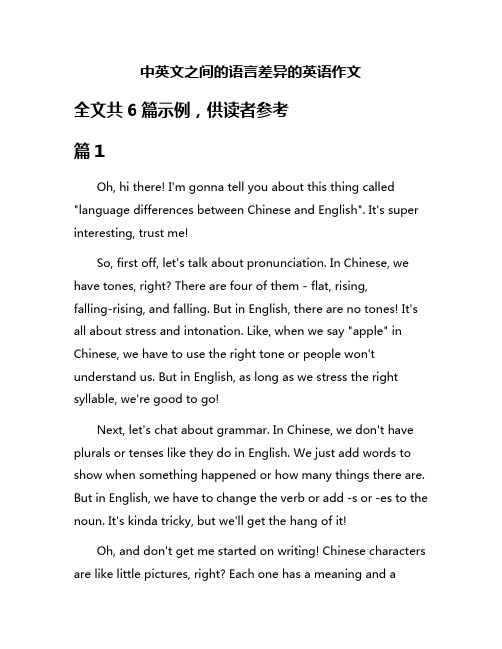
中英文之间的语言差异的英语作文全文共6篇示例,供读者参考篇1Oh, hi there! I'm gonna tell you about this thing called "language differences between Chinese and English". It's super interesting, trust me!So, first off, let's talk about pronunciation. In Chinese, we have tones, right? There are four of them - flat, rising,falling-rising, and falling. But in English, there are no tones! It's all about stress and intonation. Like, when we say "apple" in Chinese, we have to use the right tone or people won't understand us. But in English, as long as we stress the right syllable, we're good to go!Next, let's chat about grammar. In Chinese, we don't have plurals or tenses like they do in English. We just add words to show when something happened or how many things there are. But in English, we have to change the verb or add -s or -es to the noun. It's kinda tricky, but we'll get the hang of it!Oh, and don't get me started on writing! Chinese characters are like little pictures, right? Each one has a meaning and apronunciation. But in English, we gotta memorize all those letters and how they go together to make words. It's a lot of work, but we'll get there!Anyway, the point is, learning English is a bit different from learning Chinese, but it's also super cool! So let's keep practicing and having fun with it. Who knows, maybe one day we'll be fluent in both languages!篇2Oh my goodness! Today, I want to talk about the differences between Chinese and English language. It's like comparing apples and oranges, they are so different!First of all, in English, the word order is different from Chinese. In English, we say "I love you", but in Chinese, it's "" which means "I you love". It's like they are playing musical chairs with the words!Also, in Chinese, we have tones. It's like singing a song when we speak. There are four tones in Mandarin Chinese, and if you say a word with the wrong tone, it could mean something completely different. It's like walking on a tightrope!Another big difference is the writing system. In English, we use the alphabet with 26 letters. But in Chinese, they use characters that represent words or ideas. It's like writing a secret code!And don't even get me started on grammar! In English, we have tenses like past, present, and future. But in Chinese, they don't have tenses. It's like living in a time warp!But you know what? Despite all these differences, both languages are beautiful in their own way. They each have their own unique charm and character. It's like having two best friends who are totally different but still get along great.So let's celebrate the differences between Chinese and English language. Let's embrace the diversity and richness of both languages. After all, variety is the spice of life!篇3Oh, hi there! Today I want to talk about the differences between Chinese and English language. It's super interesting, you know!So, in English, we write from left to right and in Chinese, they write from top to bottom. It's like totally the opposite! And didyou know that in English, we use the alphabet with letters like A, B, C, while in Chinese, they use characters called hanzi? It's so cool!Another difference is that English has verb tenses like past, present, and future, while Chinese doesn't really have verb tenses. They just use different words to show when something happened. It's kind of tricky to understand, but also kinda awesome!Also, in Chinese, the grammar is different from English. Like, in English, we say "I eat an apple," but in Chinese, they say "I eat one apple." It's like they have to use a number before the noun, which is so different from English.And don't even get me started on pronunciation! English has all these weird sounds like th, ch, sh, while Chinese has tones like ma, ma, ma, ma. It's like a whole new way of speaking!But you know what? Despite all these differences, both languages are super cool and fun to learn. It's like exploring a whole new world of words and sounds. So let's keep learning and discovering more about Chinese and English language differences! Yay!篇4Hello everyone, today let's talk about the differences between Chinese and English! Do you know that Chinese and English are totally different languages? Yeah, it's like comparing apples to oranges!First off, Chinese characters are like little pictures that represent words, while English uses an alphabet with letters that make up words. So when you're learning Chinese, you have to memorize all those characters, but in English, you just need to learn the letters of the alphabet.Another big difference is the way we speak. In Chinese, we have tones that can change the meaning of a word, like ma with a falling tone means "mom," and ma with a rising tone means "horse." But in English, we don't have tones, so the way you say a word doesn't change its meaning.Also, Chinese grammar is pretty different from English grammar. In Chinese, the word order is subject-verb-object, like "I eat rice." But in English, it's subject-verb-object, like "I eat rice." See how the word order is different?One more thing is that Chinese has lots of honorifics and polite language that we use when talking to our elders or superiors. In English, we don't have as many of those formalities, so it's more casual when we talk to people.So there you have it, the differences between Chinese and English are like night and day! But hey, learning a new language is super fun and exciting, so why not give it a try? Who knows, you might become a language master someday!篇5Title: The Differences Between Chinese and English LanguagesHey guys, have you ever noticed how different Chinese and English languages are? Well, today I’m going to talk about some of these differences and why they exist.First of all, let’s talk about the writing system. In Chinese, we use characters to represent words, while in English, letters are used to form words. This means that Chinese characters can be quite complex and have strokes, while English letters are more simple and straightforward.Another difference is the grammar. Chinese grammar is very different from English grammar. In Chinese, we don’t have tenses like past, present, and future. Instead, we use time words to show when something happened. For example, we say “” to mean “I ate dinner yesterday”. In English, you would say “I ate dinner yesterday”.Also, the pronunciation is different. Chinese is a tonal language, which means that the tone of a word can change its meaning. For example, the word “ma” can mean “mother”, “hemp”, “horse”, or “scold” depending on the tone. In English, tone doesn’t change the meaning of a word.Overall, Chinese and English are two very different languages. But that’s what makes them so interesting! It’s important to learn and appreciate the differences between languages, so we can better understand and communicate with people from different cultures. So, keep learning and exploring the world of languages! Byebye!篇6Title: The Difference Between English and Chinese in a Little Kid's PerspectiveHey guys! Do you know that English is super different from Chinese? I'm gonna tell you all about it!First of all, the way we write in English is soooo different from Chinese. In English, we use the alphabet with 26 letters to make words. But in Chinese, they use characters that look super cool! Each character has its own meaning and pronunciation. It's like a secret code!Next, let's talk about speaking English and Chinese. When we speak English, we have to be careful with our pronunciation. There are so many tricky sounds like "th" and "r" that we have to practice. But in Chinese, the tone is super important. If you say a word with the wrong tone, it could mean something totally different!Also, English and Chinese have different ways of showing respect. In English, we use "Mr." or "Mrs." before someone's name to show respect. But in Chinese, they use titles like ""(lǎoshī) for teacher or "" (yéyé) for grandpa. It's so cool how they show respect in different ways!In conclusion, English and Chinese are two totally different languages with their own unique features. It's like they come from different worlds! But that's what makes learning languages so fun. We get to explore new sounds, words, and ways of thinking. So let's keep learning and discovering the amazing world of languages! Thanks for listening, guys! Bye bye!。
中西方语言文化对比
中西方语言文化对比摘要:随着社会经济的迅速发展,中西方之间的交流也越来越密切。
英语作为世界第一通用语言,直接关系着双方的沟通交流。
英汉互译是跨文化的交际行为。
在现实生活中,基于双方文化背景不同、地域文化及风俗习惯不同等,导致在英语翻译中存在很大的偏差。
因此,本文着重从价值观念、思维习惯与语言习惯、宗教信仰、日常生活与社会习惯和地理环境与物质生产方式等几个方面进行中西文化对比,并将英汉种语言文化差异影响而产生的不同表达方式进行比较。
在此,本文针对中西文化差异对英语翻译影响这一问题,做以下论述。
关键词:文化,中西文化差异,中西语言文化差异The communication between China and the West is becoming more and more frequent with the rapid development of social economy . English that works as the world's first language effects the communication between the both sides directly.English-Chinese translation is a communication behavior across the culture.In real life, the different cultural backgrounds, different regional cultures and customs lead to significant deviation in the English translation.Therefore, this article compares Chinese and Western culture emphatically from several aspects,such as the values, thinking habits, religious beliefs,language habits ,daily lives , social customs ,geographical environment and material production mode . Then we talk about the details of means of expression in English and Chinese languages from the differences.At this point, this article gives the following discussions that the influence of English translation comes from the differences between Chinese and Western culture .Abstract:Culture is Shared, it is a series of concepts, values and code of conduct, it is to make individual behavior ability accepted by collec tive common standards, it is closely related to culture and society a nd life, culture exists in society.Every culture decides how physiol ogical psychological needs to be met .So a kind of culture derived a behavior, a kind of behavior determines a result, a result decide wha t kind of a future. Culture is closely connected with the future of t he world.Language is the product of society, it is the carrier of culture and it is the crystallization of human history and heritage.It embodiessocial consciousness in national passed from generation to generatio n , historical culture, customs and various aspects of all human soci ety features.Different cultural background and cultural traditions,m ake Chinese and Western different in the way of thinking, values, code of conduct and the way of life.Considerable cultural differences makes a big difference between Chinese and western languages.We will su mming rules, strengthen the exchange of Chinese and western language, so as to promote cultural exchange and development through the analys is of the different culture between Chinese and western cultural diff erences in language .Key words: culture, Chinese and western cultural differences, the lan guage of Chinese and western cultural differences目录目录 (3)一中西方文化差异在语言中的体现 (4)一)风俗习惯 (4)二)个人隐私 (4)三)宗教信仰 (4)四)思维方式 (5)五)个人主义价值观 (5)二中西语言具体差异 (5)一)汉语与英语的字词组成差异 (5)二)词类及其应用方面的的差异。
汉字的中英文对比作文
汉字的中英文对比作文英文:As a language learner, I have always been fascinated by the differences and similarities between Chinese and English. The two languages are quite different in terms of their writing systems, grammar, and pronunciation. 。
First of all, Chinese characters are logograms, which means that each character represents a word or a morpheme, while English uses an alphabet system. This makes Chinese writing visually distinct and beautiful, but also more challenging to learn. For example, the Chinese characterfor "mountain" (山) is a pictograph that resembles the shape of a mountain, while the English word "mountain" is made up of letters that have no visual connection to the concept of a mountain.Secondly, the grammar of Chinese and English is also very different. Chinese has a subject-verb-object wordorder, while English has a subject-verb-object word order. This means that when I speak Chinese, I have to rearrange my thoughts in a different way than when I speak English. For instance, in Chinese, I would say "我喜欢吃米饭" (Ilike to eat rice), while in English, I would say "I like to eat rice."Lastly, the pronunciation of Chinese and English presents its own set of challenges. Chinese is a tonal language, which means that the meaning of a word can change depending on the tone in which it is spoken. English, on the other hand, is not a tonal language. This has caused me some embarrassment when trying to speak Chinese, as I have often used the wrong tone and inadvertently said something completely different from what I intended.中文:作为一个语言学习者,我一直对中英文之间的差异和相似之处感到着迷。
从语言学角度对比中英语言文化差异
从语言学角度对比中英语言文化差异中英语言文化差异是指中文和英文在语言结构、词汇使用、语言习惯等方面存在的差异。
从语言学的角度来看,中英语言文化差异主要体现在以下几个方面:一、语音音素和语音规则的差异中文和英文在语音音素上存在一定差异。
中文中,音节的音质较为简单,音节中的声母和韵母构成了音节的基本重要部分。
而英文中,辅音相对较多,辅音和元音的组合形式也较为复杂。
英文的元音数量较多,元音的发音也比中文更加多变。
二、词汇差异中英语言的词汇有很大的差异。
中文的词汇较为丰富,很多个词汇可以有多种不同的意思,一个字可以表示一个意义,也可以结合其他字形成词组,具有很高的词汇灵活性。
而英文的词汇相对较为简单,虽然英语也有同音或近音的词汇,但在一般情况下,同一个词只有一个特定的意义。
三、句法和语法差异中文和英文在句法和语法上也存在差异。
中文属于屈折语言,名词和形容词没有单/复数、性别、格的变化,这使得中文的句子结构相对简单。
而英文则属于有形态变化的屈折语言,名词和形容词的单/复数、性别、格等变化较多,使得英文的句子结构相对复杂。
四、文化差异中英语言的文化背景也造成了一定的差异。
中文表达更偏重于内涵,强调文化内涵的分享和传递,注重语言的修辞手法,而英文表达更注重事实表述,偏向于简洁和直接。
因为中英两个文化的差异,导致中英语言的使用中也会出现一些行为规范的差异,例如语气的使用、尊称的使用等。
中英语言文化差异在语音音素、词汇、句法和语法等方面都存在一定的差异。
这一差异主要源于两个语言的历史文化差异以及语言的不同特点。
了解和体会这些差异有助于更好地掌握和运用两种语言,促进中英两种文化之间的交流与理解。
二 英汉语言对比
二、英汉语言差异性对比——句法
1. 句子结构
英语:形合 (hypotactic)
句中的词语或分句之间用语言形式手段(如关联词) 连接起来,表达语法意义和逻辑关系。
汉语:意合 (paratactic)
句中的语法和逻辑关系用词语和分句的意义来表达。
If winter comes, can spring be far behind? 冬天来了,春天还会远吗?
主要内容
一、中西方思维Βιβλιοθήκη 式差异对比二、英汉语言差异性对比
1. 词法对比 2. 句法对比 3. 表达方式对比
一、中西方思维方式差异对比
西方人好直线, 东方人好曲线, 西方人重解析, 东方人看整体, 西方人偏精确, 东方人偏模糊,
西方人喜偏激, 东方人喜中庸。
二、英汉语言差异性对比——词法 英语:综合语 (synthetic)
三、英汉语言差异性对比——表达方式 英语:静态 (static)
倾向于多用名词 名词化:指用名词来表达原来属于动词的(或形容词) 所表达的概念。
汉语:动态 (dynamic)
倾向于多用动词
He is a good eater and sleeper. 他能吃能睡。
My good fortune has sent you to me, and we will never part. 我很幸运,能够得到你,让我们永不分离吧。
What in the world do you mean? 你究竟是什么意思呀? Come on, everybody! 大家都来吧! All that made this Christmas Day was my knowing it was. 今天算是圣诞节,只是因为我知道是圣诞节罢了。
- 1、下载文档前请自行甄别文档内容的完整性,平台不提供额外的编辑、内容补充、找答案等附加服务。
- 2、"仅部分预览"的文档,不可在线预览部分如存在完整性等问题,可反馈申请退款(可完整预览的文档不适用该条件!)。
- 3、如文档侵犯您的权益,请联系客服反馈,我们会尽快为您处理(人工客服工作时间:9:00-18:30)。
从中式英语谈英汉语言对比
一、中式英语的概念和特点
中式英语,亦称为中国英语或者汉式英语,是指中国人在使用英语时,受母语汉语习
惯影响,经常出现语法错误,语言表达不够准确和完美的现象。
这些错误通常被称为“中
式英语”或者“Chinglish”(中式英语的英文名称)。
中式英语的典型特征包括:
1、语法错误。
中式英语中,由于英语语法与汉语语法不同,经常出现主谓不一致、
动词时态混淆等错误。
例如,一些中文使用者常常说:“It doesn't depends on you”或者“Yesterday I has seen him”,这些语法错误是中式英语的典型表现。
2、词汇使用不当。
中式英语中,由于中文对于单词的用法与英文存在差异,经常出
现词汇使用不当的情况,导致表达意思不够准确。
例如,一些中文使用者常常说:“I will put your name in the black list”或者“Can you borrow me your pen?”,这些错误使用了“black list”和“borrow”这两个词汇。
3、语言表达欠缺。
中式英语中,由于中国学生在英语教育中侧重于语法知识的学习,而没有注重口语表达和听说训练,导致了在语言表达方面的缺陷。
例如,一些中文使用者在说英语时,经常不清晰、语调单一、口音重。
二、中式英语产生的原因和影响
中式英语之所以会产生,是因为英汉两种语言的差异非常复杂,这些差异涉及到语法、词汇、语音、文化等多个方面。
由于母语对语言学习的影响非常重要,因此,中国学生在
学习英语时,往往受到了母语的干扰,导致了中式英语的产生。
中式英语的出现,不仅影响了人们的语言交流,也在一定程度上阻碍了中国与外国的
商务和文化交流。
在商务交流中,一些中式英语的表述方式可能使外国客户感到难以理解,甚至影响到了交流的效果。
此外,中式英语也容易引起误解和笑话,对中国人的形象造成
了一定的负面影响。
三、英汉语言对比的其他方面
除了中式英语之外,英汉两种语言存在着许多其他方面的对比。
以下是其中的一些方面:
1、语法结构对比。
英语语法结构与汉语不同,因此语法是汉语学习者的一个难点。
例如英语语法中存在着冠词、时态的变化,而这些在汉语中是不需要的。
2、词汇的差异。
英汉两种语言的词汇也存在一定的差异。
例如“加油站”在汉语中表示的是加油的地方,在英语中表示的是充气站。
3、语音和发音对比。
英汉两种语言的语音系统也存在差异。
英语中存在着一些辅音和元音的发音汉语中没有,因此这些发音对于汉语学习者来说也是一个要克服的难点。
4、文化差异。
英汉两种语言也存在着文化差异,这意味着用语的方式和用词的侧重点也存在差异。
例如在英语中,“你好”与“Hello”表达的都是打招呼的意思,但是在汉语中“你好”这个短语所代表的意义远远比“Hello”更加丰富。
